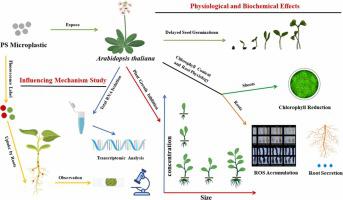当前位置:
X-MOL 学术
›
J. Hazard. Mater.
›
论文详情
Our official English website, www.x-mol.net, welcomes your
feedback! (Note: you will need to create a separate account there.)
Physiological and biochemical effects of polystyrene micro/nano plastics on Arabidopsis thaliana
Journal of Hazardous Materials ( IF 12.2 ) Pub Date : 2024-02-23 , DOI: 10.1016/j.jhazmat.2024.133861 Zhefu Yu 1 , Xiaolu Xu 2 , Liang Guo 2 , Seyit Yuzuak 3 , Yin Lu 2
Journal of Hazardous Materials ( IF 12.2 ) Pub Date : 2024-02-23 , DOI: 10.1016/j.jhazmat.2024.133861 Zhefu Yu 1 , Xiaolu Xu 2 , Liang Guo 2 , Seyit Yuzuak 3 , Yin Lu 2
Affiliation

|
Microplastics have garnered global attention due to their potential ecological risks. Research shows micro/nano-plastics pollution has adverse effects on plant growth, development, and physiological characteristics. However, the mechanisms underlying these effects remain unclear. The study examined the effects of polystyrene micro/nano-plastics with varying sizes and concentrations on different physiological and biochemical markers of . The indicators assessed include seed viability, growth, chlorophyll content, accumulation of root reactive oxygen species, and root exudates. Using fluorescence labeling, we investigated the absorption and translocation processes of micro/nano-plastics in . We also performed transcriptomic analysis to better understand the particular mechanisms of micro/nano-plastics. It indicated that micro/nano-plastics had an adverse effect on seed germination, especially under high concentration and small particle size treatments. This effect diminished with prolonged exposure. High concentrations at 50 nm and 100 nm treatment groups significantly inhibited the growth. Conversely, low concentrations of 1000 nm had a promoting effect. Exposure to micro/nano-plastics potentially resulted in decreased chlorophyll content, the accumulation of HO in roots, and stimulated root secretion of oxalic acid. Through transcriptomic analysis, the gene expression linked to micro/nano-plastic treatments of varying sizes enriched multiple metabolic pathways, impacting plant growth, development, environmental adaptation, metabolism, pigment synthesis, and stress response.
中文翻译:

聚苯乙烯微纳米塑料对拟南芥的生理生化影响
微塑料因其潜在的生态风险而引起了全球的关注。研究表明,微/纳米塑料污染对植物的生长、发育和生理特性有不利影响。然而,这些影响背后的机制仍不清楚。该研究检查了不同尺寸和浓度的聚苯乙烯微/纳米塑料对不同生理和生化标志物的影响。评估的指标包括种子活力、生长、叶绿素含量、根活性氧积累和根系分泌物。使用荧光标记,我们研究了微/纳米塑料的吸收和易位过程。我们还进行了转录组学分析,以更好地了解微/纳米塑料的特定机制。结果表明,微/纳米塑料对种子萌发有不利影响,尤其是在高浓度和小粒径处理下。这种效果会随着长时间暴露而减弱。50 nm 和 100 nm 处理组的高浓度显著抑制了生长。相反,1000 nm 的低浓度具有促进作用。暴露于微/纳米塑料可能导致叶绿素含量降低、HO 在根中积累并刺激根分泌草酸。通过转录组学分析,与不同大小的微/纳米塑料处理相关的基因表达富集了多种代谢途径,影响植物的生长、发育、环境适应、代谢、色素合成和胁迫反应。
更新日期:2024-02-23
中文翻译:

聚苯乙烯微纳米塑料对拟南芥的生理生化影响
微塑料因其潜在的生态风险而引起了全球的关注。研究表明,微/纳米塑料污染对植物的生长、发育和生理特性有不利影响。然而,这些影响背后的机制仍不清楚。该研究检查了不同尺寸和浓度的聚苯乙烯微/纳米塑料对不同生理和生化标志物的影响。评估的指标包括种子活力、生长、叶绿素含量、根活性氧积累和根系分泌物。使用荧光标记,我们研究了微/纳米塑料的吸收和易位过程。我们还进行了转录组学分析,以更好地了解微/纳米塑料的特定机制。结果表明,微/纳米塑料对种子萌发有不利影响,尤其是在高浓度和小粒径处理下。这种效果会随着长时间暴露而减弱。50 nm 和 100 nm 处理组的高浓度显著抑制了生长。相反,1000 nm 的低浓度具有促进作用。暴露于微/纳米塑料可能导致叶绿素含量降低、HO 在根中积累并刺激根分泌草酸。通过转录组学分析,与不同大小的微/纳米塑料处理相关的基因表达富集了多种代谢途径,影响植物的生长、发育、环境适应、代谢、色素合成和胁迫反应。






























 京公网安备 11010802027423号
京公网安备 11010802027423号